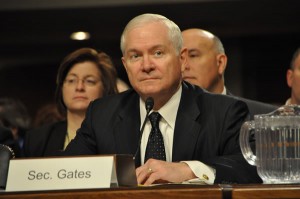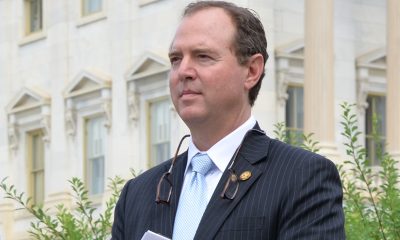National
‘Don’t Ask’ could get ‘more humane’ guidelines this week
Service members threatened with potential discharge under “Don’t Ask, Don’t Tell” may

Service members threatened with potential discharge under “Don’t Ask, Don’t Tell” may soon be able to breathe easier after Pentagon lawyers complete their assessment on finding a “more humane” way to implement the law.
The assessment, due for completion this week, is taking place because Defense Secretary Robert Gates tasked the Pentagon’s Office of the General Counsel to review the regulations for “Don’t Ask, Don’t Tell” to see if the Department of Defense could implement the law in a fairer manner.
After asking last year for a preliminary assessment for what he called a potentially “more humane” policy, Gates announced before the Senate Armed Services Committee on Feb. 2 the review would be complete in 45 days. Earlier this month, Jeh Johnson, the Pentagon’s top lawyer, said during congressional testimony the assessment would be finished on or around March 19.
But what these final changes will entail is unknown because information about them isn’t public. The Defense Department didn’t respond to DC Agenda’s request to comment on the new regulations.
Also unknown is the timing for when the Pentagon will unveil these changes, as well as how long it would take for Gates to implement them once he receives the recommendations.
Repeal advocates say they’re unsure what Pentagon lawyers will ultimately produce, but have issued recommendations for changing the application of “Don’t Ask, Don’t Tell” under the current statute.
Aubrey Sarvis, executive director of the Servicemembers Legal Defense Network, said his organization provided the Defense Department in July with a list of possible changes that could be made.
Among these changes are mandating evidence when a possible violation of “Don’t Ask, Don’t Tell” comes from a fellow service member and not a civilian; eliminating anonymous tips as the basis for the start of an inquiry; and requiring that alleged homosexual conduct on which any discharge is based occurs after a service member joined the armed forces.
“And actually, Secretary Gates and Adm. Mullen referred to all six of those at the Feb. 2 hearing, but we don’t have any concrete intelligence as to what Mr. Johnson may or may not be recommending to the secretary,” Sarvis said.
During that testimony, Gates raised some possibilities on what the changes could entail. He said the Pentagon could raise the level of the officer who initiates or conducts inquiries, as well as what constitutes a credible source to start an investigation.
Gates also told lawmakers the Defense Department can “reduce the instances” in which a service member is outed by a third party under “Don’t Ask, Don’t Tell.”
Alex Nicholson, executive director of Servicemembers United, said the actual benefit to gay soldiers of eliminating third-party outings is unknown because reliable information on why service members are expelled isn’t available.
“Anybody can sort of venture to guess based on their experience and anecdotal evidence,” he said. “But it’s really hard to do that with authority or credibility because we don’t have any statistics on how many discharges are the result of self-initiated outings, how many are the results of third-party outings and how many are the result of behavior being discovered.”
Aaron Belkin, director of the Palm Center, a think-tank on gays in the military at the University of California, Santa Barbara, said if such changes are enacted, it would eliminate important problems, but still wouldn’t address other issues.
“One is you’re not going to be able to eliminate all discharges,” he said. “Two, as long as the law is on the books, you’ll still have the sword hanging over gay people’s heads, and it’s that sword that makes it difficult for them to do their job.”
Belkin said new regulations also won’t change how “Don’t Ask, Don’t Tell” damages the military “symbolically and reputationally” simply by being on the books.
During the Feb. 2 hearing, Gates said as part of these changes the Pentagon would “devise new rules and procedures” in light of the 2008 Ninth Court of Appeals ruling in Witt v. Air Force, which challenged the constitutionality of “Don’t Ask, Don’t Tell.”
The decision, which was construed to only apply to the plaintiff, determined the Pentagon needed to prove lesbian Maj. Margaret Witt’s sexual orientation was a detriment to unit cohesion in order to discharge her from the Air Force.
Applying the heightened Witt standard on a national basis was one of SLDN’s recommendations for a change under current law. Sarvis said such an application would help the Defense Department “create uniformity” in all “Don’t Ask, Don’t Tell” discharge cases.
But Belkin said he doesn’t think the Pentagon would apply the Witt standard on a national basis because it would be too big of a change.
“I would doubt that the Defense Department would take a judicial ruling that applies to one circuit and use regulation to expand its scope to the whole military,” he said. “I think that’s too big of a step for a regulatory tweak.”
Whatever changes the Pentagon makes, advocates maintain legislative repeal of “Don’t Ask, Don’t Tell” is the only way to properly address the law.
If the Pentagon implements the changes SLDN recommended, Sarvis said it would “go a long ways,” but “wouldn’t diminish the need for Congress to repeal ‘Don’t Ask, Don’t Tell.’”
Sarvis said legislative repeal is particularly needed so any conservative administration following President Obama couldn’t reverse the changes made under the existing statute.
“The next secretary and a new administration could come along and make revisions that he or she may feel they have authority for under the current statute,” he said. “That’s why I go back to changes to the regulations are not a substitute for repealing the statute.”
Federal Government
UPenn erases Lia Thomas’s records as part of settlement with White House
University agreed to ban trans women from women’s sports teams

In a settlement with the Trump-Vance administration announced on Tuesday, the University of Pennsylvania will ban transgender athletes from competing and erase swimming records set by transgender former student Lia Thomas.
The U.S. Department of Education’s Office for Civil Rights found the university in violation of Title IX, the federal rights law barring sex based discrimination in educational institutions, by “permitting males to compete in women’s intercollegiate athletics and to occupy women-only intimate facilities.”
The statement issued by University of Pennsylvania President J. Larry Jameson highlighted how the law’s interpretation was changed substantially under President Donald Trump’s second term.
“The Department of Education OCR investigated the participation of one transgender athlete on the women’s swimming team three years ago, during the 2021-2022 swim season,” he wrote. “At that time, Penn was in compliance with NCAA eligibility rules and Title IX as then interpreted.”
Jameson continued, “Penn has always followed — and continues to follow — Title IX and the applicable policy of the NCAA regarding transgender athletes. NCAA eligibility rules changed in February 2025 with Executive Orders 14168 and 14201 and Penn will continue to adhere to these new rules.”
Writing that “we acknowledge that some student-athletes were disadvantaged by these rules” in place while Thomas was allowed to compete, the university president added, “We recognize this and will apologize to those who experienced a competitive disadvantage or experienced anxiety because of the policies in effect at the time.”
“Today’s resolution agreement with UPenn is yet another example of the Trump effect in action,” Education Secretary Linda McMahon said in a statement. “Thanks to the leadership of President Trump, UPenn has agreed both to apologize for its past Title IX violations and to ensure that women’s sports are protected at the university for future generations of female athletes.”
Under former President Joe Biden, the department’s Office of Civil Rights sought to protect against anti-LGBTQ discrimination in education, bringing investigations and enforcement actions in cases where school officials might, for example, require trans students to use restrooms and facilities consistent with their birth sex or fail to respond to peer harassment over their gender identity.
Much of the legal reasoning behind the Biden-Harris administration’s positions extended from the 2020 U.S. Supreme Court case Bostock v. Clayton County, which found that sex-based discrimination includes that which is based on sexual orientation or gender identity under Title VII rules covering employment practices.
The Trump-Vance administration last week put the state of California on notice that its trans athlete policies were, or once were, in violation of Title IX, which comes amid the ongoing battle with Maine over the same issue.
New York
Two teens shot steps from Stonewall Inn after NYC Pride parade
One of the victims remains in critical condition

On Sunday night, following the annual NYC Pride March, two girls were shot in Sheridan Square, feet away from the historic Stonewall Inn.
According to an NYPD report, the two girls, aged 16 and 17, were shot around 10:15 p.m. as Pride festivities began to wind down. The 16-year-old was struck in the head and, according to police sources, is said to be in critical condition, while the 17-year-old was said to be in stable condition.
The Washington Blade confirmed with the NYPD the details from the police reports and learned no arrests had been made as of noon Monday.
The shooting took place in the Greenwich Village neighborhood of Manhattan, mere feet away from the most famous gay bar in the city — if not the world — the Stonewall Inn. Earlier that day, hundreds of thousands of people marched down Christopher Street to celebrate 55 years of LGBTQ people standing up for their rights.
In June 1969, after police raided the Stonewall Inn, members of the LGBTQ community pushed back, sparking what became known as the Stonewall riots. Over the course of two days, LGBTQ New Yorkers protested the discriminatory policing of queer spaces across the city and mobilized to speak out — and throw bottles if need be — at officers attempting to suppress their existence.
The following year, LGBTQ people returned to the Stonewall Inn and marched through the same streets where queer New Yorkers had been arrested, marking the first “Gay Pride March” in history and declaring that LGBTQ people were not going anywhere.
New York State Assemblywoman Deborah Glick, whose district includes Greenwich Village, took to social media to comment on the shooting.
“After decades of peaceful Pride celebrations — this year gun fire and two people shot near the Stonewall Inn is a reminder that gun violence is everywhere,” the lesbian lawmaker said on X. “Guns are a problem despite the NRA BS.”
New York
Zohran Mamdani participates in NYC Pride parade
Mayoral candidate has detailed LGBTQ rights platform

Zohran Mamdani, the candidate for mayor of New York City who pulled a surprise victory in the primary contest last week, walked in the city’s Pride parade on Sunday.
The Democratic Socialist and New York State Assembly member published photos on social media with New York Attorney General Letitia James, telling followers it was “a joy to march in NYC Pride with the people’s champ” and to “see so many friends on this gorgeous day.”
“Happy Pride NYC,” he wrote, adding a rainbow emoji.
Mamdani’s platform includes a detailed plan for LGBTQ people who “across the United States are facing an increasingly hostile political environment.”
His campaign website explains: “New York City must be a refuge for LGBTQIA+ people, but private institutions in our own city have already started capitulating to Trump’s assault on trans rights.
“Meanwhile, the cost of living crisis confronting working class people across the city hits the LGBTQIA+ community particularly hard, with higher rates of unemployment and homelessness than the rest of the city.”
“The Mamdani administration will protect LGBTQIA+ New Yorkers by expanding and protecting gender-affirming care citywide, making NYC an LGBTQIA+ sanctuary city, and creating the Office of LGBTQIA+ Affairs.”
-

 U.S. Supreme Court4 days ago
U.S. Supreme Court4 days agoSupreme Court upholds ACA rule that makes PrEP, other preventative care free
-

 U.S. Supreme Court4 days ago
U.S. Supreme Court4 days agoSupreme Court rules parents must have option to opt children out of LGBTQ-specific lessons
-

 Television4 days ago
Television4 days ago‘White Lotus,’ ‘Severance,’ ‘Andor’ lead Dorian TV Awards noms
-

 Music & Concerts4 days ago
Music & Concerts4 days agoBerkshire Choral to commemorate Matthew Shepard’s life













